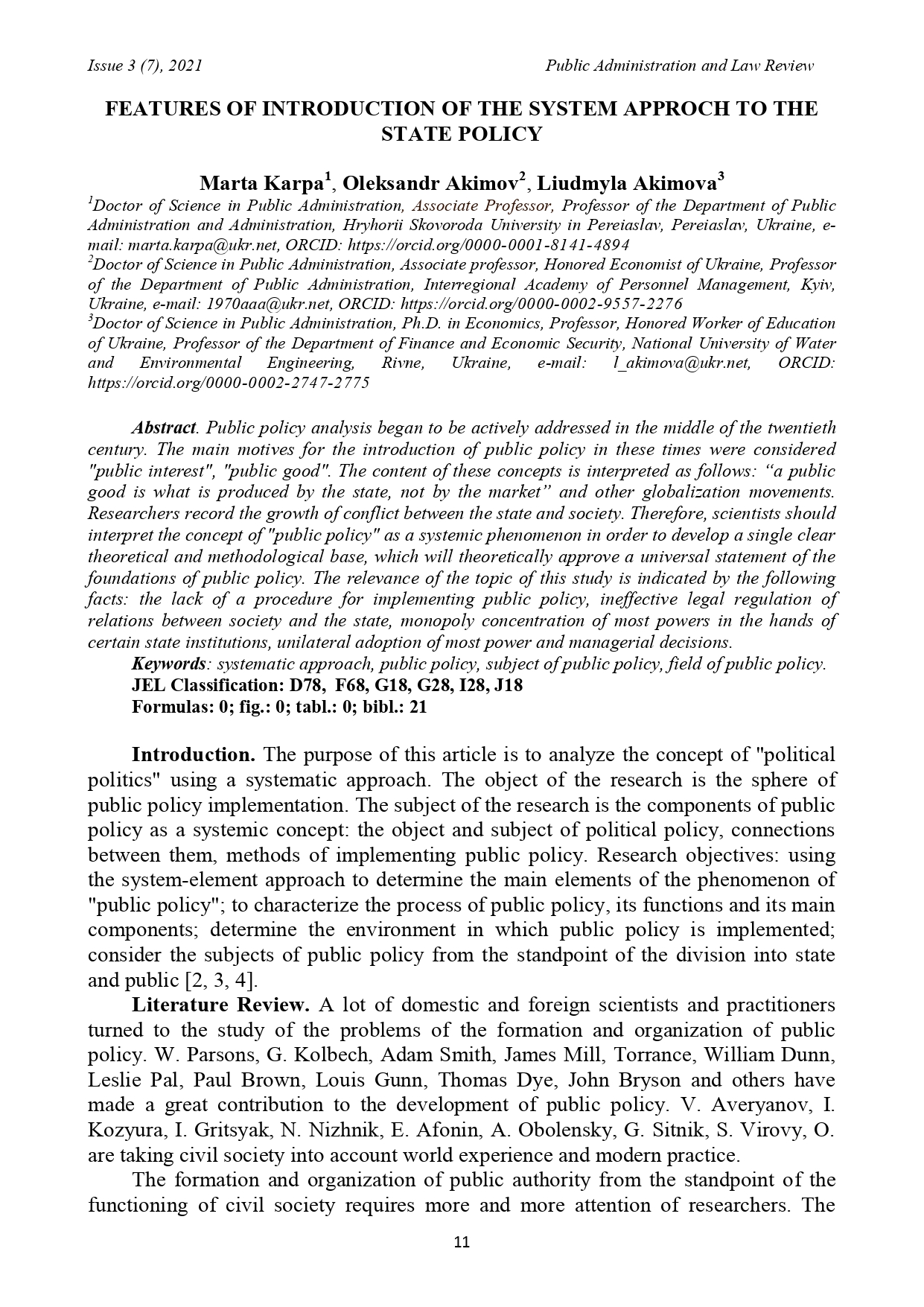FEATURES OF INTRODUCTION OF THE SYSTEM APPROCH TO THE STATE POLICY
DOI:
https://doi.org/10.36690/2674-5216-2021-3-11Keywords:
systematic approach, public policy, subject of public policy, field of public policyAbstract
Public policy analysis began to be actively addressed in the middle of the twentieth century. The main motives for the introduction of public policy in these times were considered "public interest", "public good". The content of these concepts is interpreted as follows: “a public good is what is produced by the state, not by the market” and other globalization movements. Researchers record the growth of conflict between the state and society. Therefore, scientists should interpret the concept of "public policy" as a systemic phenomenon in order to develop a single clear theoretical and methodological base, which will theoretically approve a universal statement of the foundations of public policy. The relevance of the topic of this study is indicated by the following facts: the lack of a procedure for implementing public policy, ineffective legal regulation of relations between society and the state, monopoly concentration of most powers in the hands of certain state institutions, unilateral adoption of most power and managerial decisions.
Downloads
References
Parsons, V. (2006), Public policy: An introduction to the theory and practice of policy analysis / V. Parsons, M: house "Kiev-Mohyla Academy", 2006, 549 p., P.29.
Karpa, M. (2017), Formation of competencies of public authorities: territorially-oriented approach, Efektyvnist derzh.upravlennia (text): zb.nauk.pr. LRIPA NAPA, Issue 3, pp.213-222.
Akimov, O. (2015), Formation of professional civil service in Ukraine: legal principles Public administration: theory and practice, 1 (13).
Akimov, O. (2018), The concept of systemogenesis of professional activity of civil servants. Investments: practice and experience (23). pp. 133-138.
Demyanchuk, A.P. (2007), "State policy" and "public policy": a variant of the transitional period, Scientific notes, No. 18, p.32.
Political science textbook for university students. / Ed. A.V. Babkina, V.P. Humpbacked, Moscow, Publishing Center "Academy", 1998, P.6.
Parsons, V. (2006), Public policy: An introduction to the theory and practice of policy analysis / V. Parsons, M: house "Kiev-Mohyla Academy", 2006, 549 p., P.23.
Habermas J. Democracy, reason, morality. M, 1995, P. 40.
Markina, I.A. (2001), Methodology of modern management: monograph, Moscow, Higher school, 311 p., P.61.
Deineko, A. (1971), Methodological problems of production management science, Moscow, Nauka, pp. 200-202.
Carl V. Patton, David S. Savicki. (1993), Basic Methods of Policy Analysis and Planning. Englewood Cliffs, NJ: Prentice Hall, P.5.
Sebine George G., Thorson Thomas L. History of Political Thought . Moscow, Osnovy, 1997. pp. 650-651.
Belyaeva, N. (2008), Subject field of public policy [Electronic resource], SU-HSE, Moscow,Access mode: http://www.hse.ru.
Shmatko, N.A. (2001). The phenomenon of public policy, Sociological studies, No. 7, pp. 106-112.
Karpa, M. (2017), Status of the civil servant: functional, organizational and competence aspects, State building: zb.nauk.pr. DRIPA NAPA, № 1/2017, URL: http://www.kbuapa.kharkov.ua/e-book/db/2017-1/doc/3/03.pdf.
Akimov, O. (2016), Functional factors of systemogenesis of professional activity of civil servants. Investments: practice and experience (24). pp. 68-74.
Giddens, A. (1984), The constitution of society: outline of the theory of structuration. Cambridge: Polity Press, 1984. P.74.
Karpa, M. (2017), Subject competence of public authorities, Actual problems of public administration: collection. science. etc. ORIPA / [head. ed. Izga, M.], Issue 3 (71), Odessa, ORIPA NAPA, pp. 50-56.
Akimov, O. (2016), Professional activity of civil servants and officials of local self-government: psychological aspects of personnel management. Public administration and local self-government (3). pp. 106-113.
Public administration. English-Ukrainian dictionary of terms: textbook. way. / K.O. Vashchenko, R.G. Shchokin, E.A. Romanenko, L.M. Akimova [ed.]. Kyiv: PJSC "Interregional Academy of Personnel Management", 2020, 232 p. Public administration; issue 4.
Public administration. Civil servant's desk book and politics. Conceptual and terminological dictionary / KO Vashchenko, RG Shchokin, EA Romanenko, LM Akimova [ed.]. - Kyiv: PJSC "Interregional Academy of Personnel Management", 2020, 764 p. Public administration; issue 3.
Mihus, I., Greben S. (2020). Modern approaches to the essence and forms of public administration. Public administration in the digital economy. DOI: https://doi.org/10.36690/PADE.

Downloads
Published
How to Cite
Issue
Section
License
Copyright (c) 2021 “Scientific Center of Innovative Researches” OÜ

This work is licensed under a Creative Commons Attribution-NonCommercial-NoDerivatives 4.0 International License.





